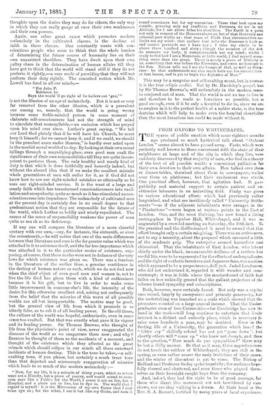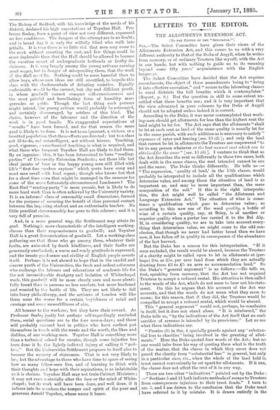FROM OXFORD TO WHITECHAPEL.
THE spasm of public emotion which some eighteen months ago produced so much hysterical talk about " Outcast London " seems almost to have passed away. Facts, which were perfectly well known to those conversant with the state of their neighbours at large and of the city in which they live, were suddenly discovered by that majority of men, who find iu a theory of the best of all possible worlds a convenient palliation for their own devotion to their own affairs. Men talked over them at dinner-tables, theorised about them iu newspapers, wailed over them on platforms ; but their excitement was sterile. One practical effect, however, that agitation had. It gave publicity and material support to certain patient and unobtrusive labourers in an uninviting field. Fixity was given to various educational efforts which had previously rather languished, and what are invidiously called " University Settlements "—as if the adjacent inhabitants were savages in the " Plantations "—were begun at various points in the East of London. One, and the most thriving, has now found a fitting resting-place in Toynbee Hall, Whitechapel, and it was inaugurated by a crowded meeting on Saturday, the 10th inst. To the practical and the disillusionised it must be owned that this effort brought only a certain misgiving. There was an artlessness, not to say a temerity, about the proposal which savoured ti little of the academic prig. The enterprise seemed hazardous and chimerical. That the inhabitants of East London, who labour chiefly under the blank, immeasurable dullness of a restless but sordid life, were to be regenerated by the efforts of undergraduates and the sight of susthetic furniture and Japanese fans, was a notion which appeared to be a preposterous, dull jest. Jaded Londoners, who did not understand it, regarded it with wonder and some contempt ; it was in fields where the mustard-seed of faith had fallen on less unkindly ground that the gallant projectors of the scheme found sympathy and subscriptions.
Both, however, were certainly found. Not only was a capital sum raised, largely by anonymous and princely generosity, but the undertaking was launched on a scale which showed that the promoters counted on a large annual income. That the Undergraduates even of two Universities—for Cambridge has now its hand in the work—will long continue to entertain that lively interest in a distant and unlovely place, which is necessary to raise some hundreds a year, may be doubted. Even in the fleeting life of a University, the generation which heard the " bitter cry " skilfully echoed has not yet "gone down "; but shortly others will " come up " who knew not Joseph, and then to the question, "How much do you sympathise ?" there may be but a chilly answer. Be that as it may, these apprehensions do not touch the settlers of Whitechapel ; they are still in the spring, or even rather nearer the early fruit-time of their cause, and the winter of discontent is yet to come. The Bishop of Bedford and Professor Seeley spoke hopefully; the audience hopefully cheered and chattered, and even those who piqued themselves on their foresight caught hope from the company.
And, indeed, they had the right to be of good courage, for those who direct this movement are not bewildered by vain shows, nor are they walking in a dream. At their head is the Rev. S. A. Barnett, fortified by many years of local experience. The Bishop of Bedford, with his knowledge of the needs of his district, declared his high expectations of Toynbee Hall. Professor Seeley, from a point of view not very different, expressed no less confidence. The dangers of the attempt are in no doubt ; and in broad day it is only the wilfully blind who walk into pitfalls. It is true there is no little risk that men may come to the work without counting the cost, and few things could be more deplorable than that the Hall should be allowed to become the vacation re3ort of undergraduate hotheads or frothy declaimers. It is very largely among the young artisans earning good wages, but in danger of misspending them, that the work of the Hall must lie. Nothing could be more harmful than to allow boys, whose own ideas are still unsettled, to beguile this class with the rhodomontade of debating societies. Equally undesirable would be the earnest, but shy and diffident youth, in whom goodwill cannot conquer self-consciousness and the most painful and humiliating form of humility masquerades as pride. Though the last thing such persons might intend, the young artisan would probably be estranged, and certainly discouraged, by settlers of this kind. The choice, however, of the labourer and the direction of the work is in good hands. No exaggerated expectations of " results " have been formed, and for that reason the more good is likely to be done. It is not to an ignorant, a vicious, or a besotted population that these efforts are directed ; but to a class not ill-to-do, not unintelligent, not without leisure. Teaching, good, vigorous, rumechanical teaching, is what is required, and what those who frequent Toynbee Hall are likely to find there. By an ingenious: idea, it has been determined to have "readingparties " of University Extension Students ; not those idle but ideal jaunts of four or five happy young men still filled with life's " first fine careless rapture" which poets have sung and most men recall with fond regret ; though who knows but that for a short time even that might be managed in the summer for some of the more fortunately-circumstanced Londoners P The East-End " reading-party " is more prosaic, but is likely to do more hard work than is often achieved by the University variety. It is an informal class of reasonably small dimensions, formed for the purpose of securing the benefit of close personal contact between the. inquiring student and an enthusiastic teacher. No little practical statesmanship has gone to this scheme ; and it is very full of promise.
And, in a more general way, the Settlement may attain its goal. Nothing is more characteristic of the intelligent workingclasses than their responsiveness to goodwill ; and Toynbee Hall is a great demonstration of goodwill. Let a working-class gathering see that those who go among them, whatever their faults, are animated by frank kindliness, and their faults are generously overlooked; a warm and ready gratitude is expressed, and the innate good-sense and civility of English people asserts itself. Perhaps it is not absurd to hope that in the candid and sincere youth of the Universities, the fresh and ardent reformers who exchange the labours and relaxations of academic life for the not inconsiderable drudgery and isolation of Whitechapel work, this goodwill will be more clearly seen and more plentifully found than in persons no less resolute, but more hardened and wearied by the battle of life. They are not likely to fall into fussy philanthropy, and the artisans of London will like them none the worse for a certain boyishness of mind and carriage and sonic unworldliness of aim.
All honour to the workers ; but they have their reward. As Professor Seeley justly but perhaps self-regardingly reminded them, social questions are to the fore now-a-days ; and those will probably succeed best in politics who have earliest put themselves in touch with the wants and the worth, the likes and dislikes, of our working-men. Toynbee Hall is something more than a technical school for curates, though some injustice has been done it by the lightly-inflicted injury of calling it "godless." But the Universities Settlement proposes to itself also to become the nursery of statesmen. That is not very likely to be ; but the advantage to those who have time to spare of seeing how so many fellow-men live, and of learning to think with their thoughts and hope with their aspirations, is as indubitable as it is obvious. Toynbee Hall may not train Cabinet Ministers ; it may not even materially alter the face or the mind of Whitechapel ; but its work will have been done, and well done, if it infuses into its members the temper and spirit of the pure and generous Arnold Toynbee, whose name it bears.



































 Previous page
Previous page